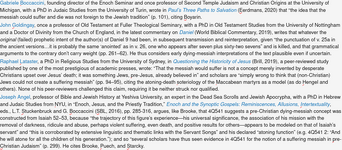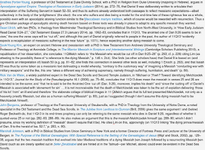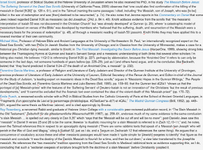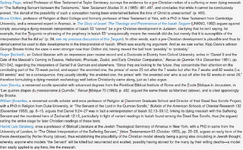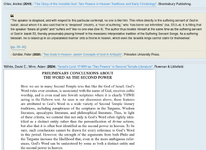The Idea That Some Jews Were Already Expecting a Dying Messiah
In Element 5 of Chapter 4 of my study
On the Historicity of Jesus I summarized existing scholarship concluding that there was a lot of evidence for the possibility, if not indeed the probability, that some Jewish sects already were expecting a dying messiah, and that this was already a component of their eschatological timetable. I even point out elsewhere in that book that this apocalyptic expectation, claimed to have been found hidden in scripture, might have inspired actual messianic pretenders to try and make that happen, which could
also explain a
historical Jesus (pp. 68–72, 245–46; for a humorous yet still serious outline of this theory, see my Wichita Talk,
You’re All Gonna Die!! How the Jews Kept Failing to Predict Doomsday and Caused Christianity Instead). But this also wipes out a common defense of historicity: the argument that no Jews would ever have thought of such a thing—without actually suffering the unexpected death of their (thereby necessarily historical) messiah.
That argument is refuted of course by that fact that, actually, that had already happened: Daniel 9:26
assigns the death of the “messiah” Onias III as a key sign of the apocalypse. So coming up with such a notion by exactly that kind of historical motivation
already predates Christianity by almost two centuries. But since the end
didn’t come as the book of Daniel originally intended, many sects (as we already see happening at Qumran) started feverishly trying to reinterpret that “dying messiah” prophecy as somehow in their future. This is all we need to explain how someone could then
invent a suitable new candidate to mark the end of the world. A real guy was no longer needed for that. An imaginary one would do. That is, after all, the easiest way to fulfill a prophecy.
But it’s only the worse that, in fact, there is no evidence for this alleged universal “opposition” among Jews to such a prophetic timetable anyway, and actually quite a lot of converging circumstantial evidence for the opposite: that some Jews were ginning up messianic readings of Isaiah’s Suffering Servant prophecy (Is. 52–53) into just such an expectation, and scouring scriptures to learn more about it. Later, Talmudic Jews simply adopted the idea as a matter of course—we find
no opposition at all in the Talmud to the idea of a suffering or dying messiah. And the clues that survive, from Jewish Medieval and Talmudic exegesis all the way back to ancient scriptures, apocrypha, and the Dead Sea Scrolls, all triangulate toward this being much earlier than later. Certainly, there is no
evidence it was only invented late; whereas there is
some evidence it was invented early. And at the very least, even if you aren’t sure of that, the evidence is sufficient to establish this
could have happened, and thus is a
plausible pathway to the invention of Christianity. Either way, the attempt to argue this is impossible fails.
Against this it is said no one with “real” expertise believes this, and that I have interpreted all the evidence incompetently, and the consensus is overwhelmingly against me. In actual fact, what I argued is argued by well over a dozen experts now, many of unimpeachable competence and qualifications, all under peer review. And many more concur as to its plausibility, just as I affirmed. There is in fact no argument I made that hasn’t passed peer review multiple times, in studies completed by some of the most prominent experts in Hebrew, Talmud, Second Temple Judaism, and the Dead Sea Scrolls.
But since the litany of internet trolls reject evidence, spit on peer review, and lean instead on the apologetic tactic of cherry-picking the obsolete opinions of scholars who only conclude the way they want (but who never actually rebut, rarely even at all much less effectively, scholars arguing the other side), and insist, rather, on “arguments from prestige” whereby only scholars of suitable
social status count, and only some never-admitted “number” of them have to say this before being believed, let’s survey the
actual status of this question in the field today—mustering all the prestige you could want. Because in actual reality, my conclusion in Element 5, and indeed even my use of evidence to that conclusion, is not fringe but mainstream. And to make very clear that anyone who tells you otherwise is lying, I have no choice but to bombard you with examples until you relent. So here goes…
David Mitchell has a PhD in Hebrew Bible from New College, Edinburgh. His book
Messiah ben Joseph (Campbell 2016) has received
wide praise among highly qualified peers, including:
Robert Gordon, a retired professor of Hebrew at Cambridge;
Alan Avery-Peck, professor of Judaic studies at Holy Cross and editor of the
Review of Rabbinic Judaism;
Mart-Jan Paul, professor of Old Testament at ETF Leuven;
Michael Heiser, a PhD in Hebrew and Semitic Studies who has held
multiple appointments and professorships in the field; even Evangelical scholars
L. Michael Morales, a professor of Biblical Studies at a seminary, with a PhD in Old Testament from Trinity College, UK, and
Michael L. Brown, who has held professorships at numerous seminaries and holds a PhD in Near Eastern Languages and Literature from NYU; and, above all, famed Judaic scholar
Lester Grabbe, who says of Mitchell’s study that “Mitchell has now devoted a monograph to the subject” of the “Messiah ben Joseph,” that the corresponding “concept of the dying and salvific Messiah is an important belief in the rabbinic period,” and that Mitchell’s “collection of material is very thorough.”
Mitchell argues, as I do in
OHJ, that the modern belief that this messianic concept derived later (such as from the disappointing experience of Bar Kochba) is based on no evidence at all (just conjecture), whereas, actually, the preponderance of evidence indicates the idea long predates that event. He deploys a triangulation of converging evidence to that conclusion, just as I did. And all those other professors of Jewish studies concur that Mitchell adequately proves this plausible or even probable from the Talmudic references I myself cited (such as
b.Sukkah 52 and
b.Sanhedrin 98), and from the Dead Sea Scrolls and their (and others’) use and interpretations
of Isaiah 53; he even agrees
with my reading of
11QMelchizedek (“This may not be the only Qumran text to feature a dying messianic figure”; cf.
Messiah, pp. 100–01). Some of these conclusions were previously published under peer review as well in David Mitchell, “Rabbi Dosa and the Rabbis Differ: Messiah ben Joseph in the Babylonian Talmud,”
The Review of Rabbinic Judaism (2005), pp. 77–90 (
vide 89–90), particularly his arguments for an early dating of the material that ended up later in the Talmud.
Mitchell’s blog is
full of summaries of his case, with a detailed understanding of the Hebrew.
In no way is his treatment of this material incompetent. Yet it reaches the same conclusions I did, with the same evidence
and more. I was only repeating the conclusions of other scholars reaching the same conclusions (I never made any argument from the Hebrew of any text myself, for example). But a survey of the literature shows that I (in
OHJ, pp. 73–81) and Mitchell (
supra) are not outliers. As you’ll see shortly, the view that pre-Christian Jews could already have been expecting (or indeed
were expecting) a dying messiah to presage the end of the world is now widely shared across the expert literature.
Nearly twenty experts now concede it—and all doing so under peer review or with the agreement of peer-reviewed experts, including many notable specialists in early Judaism, Hebrew, the Talmud, or the Dead Sea Scrolls.
For example, just this month
I cited leading scroll experts who’ve reached the same conclusion.
Timothy Lim, Professor of Hebrew Bible and Second Temple Judaism at the University of Edinburgh, a major scholar in Dead Sea Scrolls research—indeed author of one of the standard manuals on
Pesharim (Sheffield 2002)—concurs with me in reading 11Q13 as referring to a dying messiah who would presage the end of the world. And
Geza Vermes (pron. “Vèrmesh”), another renowned scrolls specialist, even commissioned Lim to add an appendix to his published comments from “The Oxford Forum for Qumran Research Seminar on the Rule of War from Cave 4 (4Q285)” in the
Journal of Jewish Studies (vol. 43, 1992, pp. 90–92), entitled “
11QMelch, Luke 4 and the Dying Messiah.” Which entails Vermes himself endorses Lim’s contribution to his own article. Vermes here agrees as well with my point (and Mitchell’s),
discussed earlier this month, about the dying Messiah ben Joseph in the Talmud; which is also the conclusion of David Mitchell as just discussed. [See
comment for a side-note here]
In this appendix to Vermes, Lim says “the herald of Isa. 52:7 is identified with ‘the anointed of the spirit’ in “reference to Dan. 9:25” in 11Q13. Lim then links this to Daniel 9:26 exactly as I did—because the author of 11Q13 says this is the one “about whom Daniel spoke,” and thus is not merely extracting one line, but referencing the entirety of what Daniel says about this person, and relating this to his own time or later. And hence, Lim concludes, “what 11QMelch does is to link the dying prince/messiah of Dan. 9 to the herald of Isa. 52:7.” He concedes this is debatable (as I do), and lists reasons for its uncertainty, but he affirms, nevertheless, that “what is unassailable is that in Dan. 9:25ff. there is a figure who is described as ‘an anointed one’ and ‘a priest’, whose appearance is connected with the rebuilding of Jerusalem and who after sixty-two weeks of years is cut off or killed (cf.
Dan. 11:22),” thus heralding the final years of the apocalypse. Mitchell cites this very discussion by Lim in concurrence with this same conclusion about 11Q13. And no one can accuse Lim and Vermesh and Mitchell of all being incompetent, of “not knowing the Hebrew,” or not understanding the Dead Sea Scrolls.
In Second Temple Judaism more generally,
Martin Hengel, a professor of New Testament Studies at the Universities of Erlanger and Tübingen, which latter had previously awarded him the PhD in Judaic studies, wrote with the assistance of Daniel P. Bailey, a PhD in New Testament studies
from the University of Cambridge, “The Effective History of Isaiah 53 in the Pre-Christian Period,” in
The Suffering Servant: Isaiah 53 in Jewish and Christian Sources, eds. Bernd Janowski & Peter Stuhlmacher (Eerdmans, 2004). Hengel and Bailey argue there that “the demonstrated uses and echoes” of Isaiah 52–53 in early Judaism “are enough to suggest that traditions of suffering and atoning eschatological messianic figures were current in Palestinian Judaism, and that Jesus and the earliest Church could have known and appealed to them,” indeed “this would explain” how that “would be comprehensible to their Jewish contemporaries” (p. 75; cf. p. 146), precisely as I argued in
OHJ.
These teachings could also have included “a Messiah ben Joseph or Messiah from Ephraim who ultimately dies” (pp. 77, 139), just as I argued. He and I even put it the same way: that “might” post date one or the other Jewish War, but “it could also be significantly older” (Mitchell, in his book and “Rabbi Dosa and the Rabbis Differ,” makes a strong case that in fact it was). But more assuredly, Hengel finds interconnections between Isaiah 53 and Wisdom 2 and 5, as I did (pp. 101, 130). He notes both are pre-Christian texts depicting a heroic “chosen one” dying but being exalted and effecting (in some way) God’s ultimate messianic plans. He also agrees with me that Daniel 9 already sets up a model for a dying messiah (p. 137), just as I argued. And he locates a wide range of other evidence for early Jewish thinking along these lines (pp. 75-146). His conclusion is even worded
the same way as mine (in case you were wondering where my disjunctive reasoning came from), with emphasis now added so you don’t miss the point he is actually making (as was I):
The expectation of an eschatological suffering savior figure connected with Isaiah 53 cannot therefore be proven to exist with absolute certainty and in a clearly outlined form in pre-Christian Judaism. Nevertheless, a lot of indices that must be taken seriously in texts of very different provenance suggest that these types of expectations could also have existed at the margins, next to many others. This would then explain how a suffering or dying Messiah surfaces in various forms with the Tannaim of the second century C.E., and why Isaiah 53 is clearly interpreted messianically in the Targum and rabbinic texts.
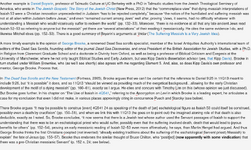
All of which led to…
That’s now Mitchell, Lim, Hengel, Boyarin, Brooke, Carrier, Boccaccini, Goldingay, Lataster, Angel, Portier-Young, Bergsma, Johnson, Knohl, Wise, Martinez, Puech, Rosenberg, Chilton, Beckwith, Starcky, Brownlee, Ginsberg, Kim, Ulrich, and Staples all affirming my Element 5—that some pre-Christian Jews had already come up with a dying-messiah expectation—
and concurring that this conclusion is at least plausible (or even probable) includes now Page, Gordon, Avery-Peck, Paul, Heiser, Morales, Brown, Bailey, Grabbe, and Vermesh. Besides myself, that’s
thirty five scholars now siding with my Element 5 being correct, nearly all of them substantial experts in Hebrew Studies generally or the Dead Sea Scrolls specifically. Indeed, this conclusion has now passed peer review in our field over
twenty times.
So, contrary to gainsaying assertions, this supposedly “controversial” conclusion of mine is actually now
mainstream and accepted as credible or even true by a large number of fully qualified experts. Indeed, many of these experts in Hebrew studies are more assertive than me: they conclude
that it is the case that some pre-Christian Jews expected a dying messiah (a conclusion I also lean toward, but do not require). And as all the righteous would be resurrected in these messianic systems, this had to indeed be as well a
resurrected messiah—which would then be why the earliest Christians were preaching the resurrection of Jesus
as the beginning of the general resurrection of all. And yet in Element 5, though I reference rising messiahs, I only argued for the
dying messiah component.
And I only settled on arguing for its
possibility, not just its actuality. But the number of scholars agreeing it’s not just possible
but actual is no longer trivial. Which in turn only
reinforces my conclusion of its plausibility—as do the
dozens of scholars concurring that it is, indeed, plausible.
--Carrier (30 August 2023).
"Some Controversial Ideas That Now Have Wide Scholarly Support".
Richard Carrier Blogs.
Cf.


